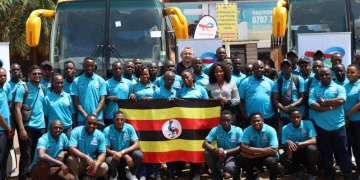A new school in Uganda has launched two initiatives aimed at transforming the country’s agricultural sector and increasing the number of women in technology.
The Quantum School of Computing, Artificial Intelligence, and Robotics has introduced programmes to harness advanced technologies for societal progress.
The initiatives, Sky-Harvest Uganda and the Her Code Her Future Foundation, were launched in Kampala, the capital city of Uganda.
“At the Quantum School, we believe in the power of technology to solve societal challenges. Sky-Harvest Uganda will transform agriculture, and Her Code Her Future will empower women to take their rightful place in Uganda’s ICT workforce,” said Prof Robert Steven Owor, Executive Director of the Center for Innovation and Emerging Technologies at Albany State University.
Sky-Harvest Uganda will use satellite data and blockchain technology to provide farmers with real-time information on weather patterns, soil health and temperature fluctuations.
This, the organisers say, will enable farmers to make data-driven decisions, leading to increased yields and improved resource management.
The Her Code Her Future Foundation aims to increase the number of women in Uganda’s technology sector, which is currently dominated by men.
Women make up only 18% of the workforce in the sector, but the foundation hopes to change this by providing training and education in artificial intelligence and other technologies.
“Our work today is not just about technology – it’s about creating opportunities, changing lives, and shaping the future. Through the power of AI education, we are unlocking new potential that will reverberate far beyond this moment,” said Ethel Mwebaza, spokesperson for the Her Code Her Future Foundation.
Ms Mwebaza added that “AI skills are no longer a luxury; they are an essential part of the workforce of the future. Through the Her Code Her Future Foundation, we are committed to ensuring that communities – particularly women and girls – are not left behind.”
The initiatives have received funding of $30m (£22m) and are expected to benefit thousands of people in Uganda.
Prof Owor said the initiatives would drive innovation and build an inclusive future for all Ugandans.











Discussion about this post